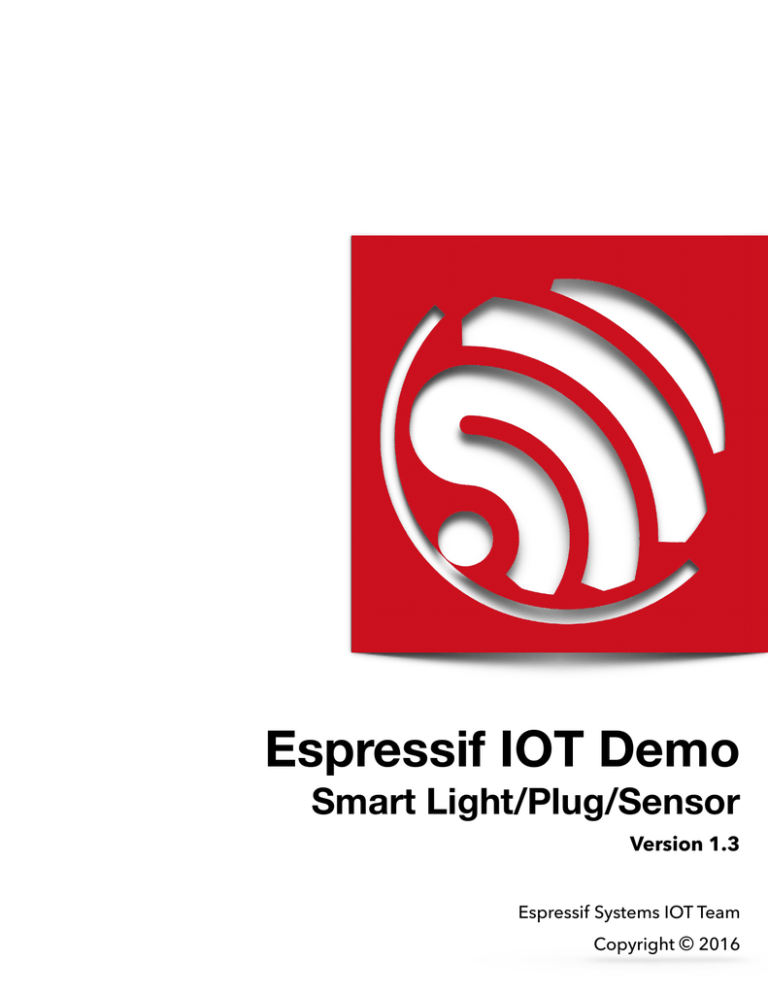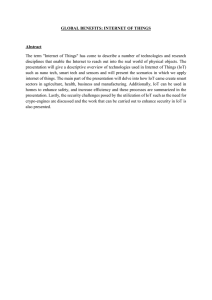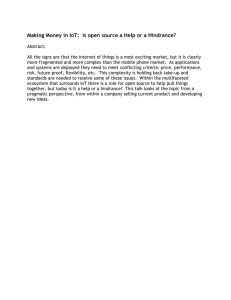
Espressif IOT Demo
Smart Light/Plug/Sensor
Version 1.3
Espressif Systems IOT Team
Copyright © 2016
!
!
Espressif Systems ESP8266 SDK IOT_Demo Guide
!
Disclaimer and Copyright Notice
Information in this document, including URL references, is subject to change without notice.
THIS DOCUMENT IS PROVIDED AS IS WITH NO WARRANTIES WHATSOEVER, INCLUDING ANY
WARRANTY OF MERCHANTABILITY, NONINFRINGEMENT, FITNESS FOR ANY PARTICULAR
PURPOSE, OR ANY WARRANTY OTHERWISE ARISING OUT OF ANY PROPOSAL, SPECIFICATION
OR SAMPLE. All liability, including liability for infringement of any proprietary rights, relating to use
of information in this document is disclaimed. No licenses express or implied, by estoppel or
otherwise, to any intellectual property rights are granted herein.
The WiFi Alliance Member Logo is a trademark of the WiFi Alliance.
All trade names, trademarks and registered trademarks mentioned in this document are property of
their respective owners, and are hereby acknowledged.
Copyright © 2016 Espressif Systems Inc. All rights reserved.
Espressif Systems Confidential
2 /20
Friday,April 22,2016
!
!
Espressif Systems ESP8266 SDK IOT_Demo Guide
!
Table of Content
Espressif Systems Confidential
3 /20
Friday,April 22,2016
!
!
Espressif Systems ESP8266 SDK IOT_Demo Guide
!
1.
Preambles ...................................................................................................5
2.
Overview ......................................................................................................5
2.1.
1.
Folder "usr"............................................................................................... 5
2.
Folder "include"........................................................................................6
3.
Folder "driver"...........................................................................................6
4.
Operating Mode........................................................................................6
2.2.
1.
3.
Debugging Tools......................................................................................6
Common errors in Curl............................................................................. 7
Functions for LAN .......................................................................................8
3.1.
General Functions....................................................................................8
1.
Get version information............................................................................. 8
2.
Set connection parameter.........................................................................8
3.2.
Device search in LAN............................................................................11
3.3.
Plug........................................................................................................12
1.
Get Status.............................................................................................. 12
2.
Set Status............................................................................................... 12
3.4.
Light.......................................................................................................13
1.
Get Status.............................................................................................. 13
2.
Set Status............................................................................................... 13
3.5.
4.
Source Code Layout................................................................................5
Humidity-Temperature Sensor...............................................................13
Functions for WAN.................................................................................... 14
4.1.
Espressif Cloud Server..........................................................................14
1.
Activation................................................................................................ 14
2.
Identification........................................................................................... 15
3.
PING Server............................................................................................ 16
4.
Plug........................................................................................................16
5.
Light.......................................................................................................17
6.
Humidity and Temperature Sensor.......................................................... 19
4.2.
User Defined Reverse Control...............................................................20
Espressif Systems Confidential
4 /20
Friday,April 22,2016
!
!
1.
Espressif Systems ESP8266 SDK IOT_Demo Guide
!
Preambles
Herein, we introduce a series of embedded applications based on Espressif’s SoC with WiFi
connectivity ESP8266. The IoT demo applications here showcase how you can develop an entire
application with this single SoC, and to realize smart connectivity for three kinds of products: smart
power plugs, smart lights, and humidity-temperature sensors. In addition, our Espressif cloud
server enables the reverse control of devices and data collection.
With the IoT demo, users can rapidly develop a variety of similar applications.
2.
Overview
The SDK provides a set of interfaces for data receive and transmit functions over the WiFi and TCP/IP
layer so programmers can focus on application development on the high level. Users can easily
make use of the corresponding interfaces to realize data receive and transmit.
All networking functions on the ESP8266 IoT platform are realized in the library, and are not
transparent to users. Instead, users can initialize the interface in user_main.c.
void user_init(void) is the default method provided. Users can add functions like firmware
initialization, network parameters setting, and timer initialization in the interface.
The SDK provides APIs to handle JSON, and users can also use self-defined data types to handle the
them.
Folder example in ESP8266_NONOS_SDK contains three application demos: IOT_Demo, AT,
smart_config. In fact, all APIs provided by SDK can be called in application, for example, users can
call smart_config APIs in IOT_Demo.
2.1.
1.
Source Code Layout
Folder "usr"
The IoT demo source code of is in the "usr" folder, and the details are as follows:
user_main.c — main file
user_webserver.c — creates a TCP server, provides REST light weighted webserver function
user_devicefind.c — creates a UDP transmission, provides device look-up function
user_esp_platform.c — communicate with Espressif Cloud
user_json.c — json packet processing function
user_plug.c — demo of plug device
user_light.c — demo of PWM light device
user_humiture.c — demo of humidity-temperature sensor device
Espressif Systems Confidential
5 /20
Friday,April 22,2016
!
!
Espressif Systems 2.
ESP8266 SDK IOT_Demo Guide
!
Folder "include"
Header files are stored in the include folder. The "user_config.h" define variables to select a demo
type to compile. Please only enable one device definition when compile.
Example:
PLUG_DEVICE, LIGHT_DEVICE, SENSOR_DEVICE
SENSOR_DEVICE can be sub-divided into HUMITURE_SUB_DEVICE and FLAMMABLE_GAS_SUB_DEVICE.
Definition below shows the flash user parameter area, users need to adjust it according to flash map
which selected during compilation.
In user_esp_platform.h
#define ESP_PARAM_START_SEC
0x3D
// or 0x7D, or 0xFD
For LIGHT_DEVICE, in user_light.h
#define PRIV_PARAM_START_SEC
0x3C
// or 0x7C, or 0xFC
0x3C
// or 0x7C, or 0xFC
For PLUG_DEVICE, in user_plug.h
#define PRIV_PARAM_START_SEC
More details about flash-map in documentation “2A-ESP8266__IOT_SDK_User_Manual”
3.
Folder "driver"
Our divers currently supports I2C Master, SPI, external buttons, PWM and Dual UART.
4.
Operating Mode
The WiFi operating mode in this IoT Demo is softAP + station -> station. It is set to softfAP + station
mode in user_esp_platform_init . Users can connect to the LAN via the softAP interface and send
commands to connect to the router via the station interface. Through the softAP interface, the user
can query the station connection status. After connection to the router is successful, the device can
be set to station mode. (For more details, please refer to 3.1.2 Setting Connection Parameters)
By default, the SSID for softAP is ESP_XXXXXX, where XXXXXX are the last three bytes of the MAC
address. The default encryption mode is WPA/WPA2.
In station mode, by pressing the button for 5 seconds, the device will be reset and restarted to
initial softAP + station mode for reconfiguration.
2.2.
Debugging Tools
The Cloud Server in the IoT Demo uses the REST architecture. When the PC is communicating with
the IoT Demo device, curl commands can be used.
Espressif Systems Confidential
6 /20
Friday,April 22,2016
!
!
Espressif Systems ESP8266 SDK IOT_Demo Guide
!
Download the specified version on http://curl.haxx.se/download.html . For use of curl commands
here, please refer to the examples shown in "Windows curl".
If you use Linux curl or Cygwin curl, please refer to examples of the curl command in "Linux/Cygwin
curl".
Unless otherwise specified, both can be used.
1.
Common errors in Curl
Take note of the upper and lower case in the commands, otherwise the command may fail.
The number of spaces curl commands may cause it to fail.
Token generated on the Server is only for 1 device and cannot be shared.
Use the right command format for Linux/Cygwin or Windows Curl. Do not mix them up.
Espressif Systems Confidential
7 /20
Friday,April 22,2016
!
Espressif Systems !
3.
ESP8266 SDK IOT_Demo Guide
!
Functions for LAN
Default IP address of softAP mode is 192.168.4.1. In station mode the IP address is assigned by
router. The IP address in the URL represents IP in softAP and station mode depending on which is
required.
Espressif softAP needs a password to connect, it depends on #define SOFTAP_ENCRYPT.
The password format is as follows:
device’s_softAPMAC_PASSWORD.
The password defined in ESP8266_NONOS_SDK/app/include/user_config.h is the softAP’s
PASSWORD.
For example:
The "PASSWORD" defined in ESP8266_NONOS_SDK_v.08 is v*%W>L<@i&Nxe!
The softAP MAC address of a device is 1a:fe:86:90:d5:7b
So the connection password is 1a:fe:86:90:d5:7b_v*%W>L<@i&Nxe!
3.1.
1.
General Functions
Get version information
curl -X GET http://ip/client?command=info
Response:
{
"Version": {
"hardware":"0.1",
"software":"0.8.0"
},
"Device": {
"product":"Plug",
"manufacture",
"Espressif Systems"
}
}
2.
Set connection parameter
Device initial state is softAP+station mode. Connect PC to LAN provided by device softAP’s interface
(password described above) and send curl to control device through PC.
Espressif Systems Confidential
8 /20
Friday,April 22,2016
!
!
Espressif Systems ESP8266 SDK IOT_Demo Guide
!
Set station mode
PCs send following command and connect device to the external network.
Linux/Cygwin curl:
curl -X POST -H "Content-Type:application/json" -d '{"Request":{"Station":
{"Connect_Station":{"SSID":"tenda", "password":"1234567890", "token":
"1234567890123456789012345678901234567890"}}}}' http://192.168.4.1/config?
command=wifi
Windows curl:
curl -X POST -H "Content-Type:application/json" -d "{\"Request\":{\"Station\":
{\"Connect_Station\":{\"ssid\":\"tenda\",\"password\":\"1234567890\",\"token\":
\"1234567890123456789012345678901234567890\"}}}}" http://192.168.4.1/config?
command=wifi
After the setup is completed, connect the device to the router in the command.
Note:
The red token length field is a random hexademical string of 40 bytes. Device will
send this random token to server for activation and identification
Users use the same random token to apply for control access to the device from Espressif Cloud, so
random token cannot be shared with other devices.
PS:
If router(AP) config is WEP HEX , the password need to convert into HEX in curl.
For example:
SSID of router is "wifi_1", the password is"tdr0123456789", encrypt as "WEP HEX", then
Linux/Cygwin curl:
curl -X POST -H Content-Type:application/json -d '{"Request":{"Station":
{"Connect_Station":{"ssid":"wifi_1", "password":"74647230313233343536373839",
"token": "1234567890123456789012345678901234567890"}}}}' http://192.168.4.1/config?
command=wifi
Windows curl:
curl -X POST -H "Content-Type:application/json" -d “{\”Request\”:{\"Station\":
{\"Connect_Station\":{\"ssid\":\"wifi_1\",\"password\":\"74647230313233343536373839
\" , \"token\": \”1234567890123456789012345678901234567890\”}}}}" http://
192.168.4.1/config?command=wifi
During the connection,the command below can be sent through PC side to query the connection
status of device
curl -X GET http://ip/client?command=status
Espressif Systems Confidential
9 /20
Friday,April 22,2016
!
!
Espressif Systems ESP8266 SDK IOT_Demo Guide
!
Response:
After connecting the PC side will send following command and change the device mode from softAP
+station mode to station mode.
For the devices which support reverse control, such as switches, lights and so on, command is:
curl -X POST http://ip/config?command=reboot
For the devices which do not support reverse control, such as sensors, the command is:
curl -X POST http://ip/config?command=sleep
The sensor devices will wake up automatically after sleep 30s and it will change to be station mode.
Set softAP parameters
Devices send following command and set parameters for softAP, such as SSID, password and so on.
Linux/Cygwin curl:
curl -X POST -H "Content-Type:application/json" -d '{"Request":{"Softap":
{"Connect_Softap":{"authmode":"OPEN", "channel":6, "ssid":"ESP_IOT_SOFTAP",
"password":""}}}}' http://192.168.4.1/config?command=wifi
Windows curl:
curl -X POST -H "Content-Type:application/json" -d "{\"Request\":{\"Softap\":
{\"Connect_Softap\":{\"authmode\":\"OPEN\",\"channel\":6,\"ssid\":\"ESP_IOT_SOFTAP
\",\"password\":\"\"}}}}" http://192.168.4.1/config?command=wifi
The devices need to be rebooted before changes take effect.
Note:
authmode supports following modes: OPEN, WPAPSK, WPA2PSK, WPAPSK/WPA2PSK.
Espressif Systems Confidential
10/20
Friday,April 22,2016
!
!
Espressif Systems ESP8266 SDK IOT_Demo Guide
!
password must be no less than 8 bytes.
Transformation of wifi mode
3.
Since ESP8266_NONOS_SDK_v0.9.2, transformation of wifi mode is as follows:
•
Device initial state is softAP+station mode.
•
Phone APP(or PC)connects to ESP8266 softAP,sends a command to make ESP8266
station connect to router(AP).
•
Connected to router(AP),ESP8266 tries to communicate with server for authentication. If
succeed , ESP8266 changes to station mode.
•
After that, ESP8266 is in station mode, only if it is disconnected from the network, ESP8266
will convert into softAP + station mode again. Then restart from step (2), try to connect again.
•
If fail to connect to router(AP), ESP8266 will try another router(AP) which has been recorded.
This function in source code defines as "#define AP_CACHE".
3.1.
Device search in LAN
Find devices by sending UDP broadcast packets to port 1025 in the LAN. The message sent is "Are
You Espressif IOT Smart Device?". Devices will respond to the received UDP broadcast packets with a
string.
Espressif Systems Confidential
11/20
Friday,April 22,2016
!
!
Espressif Systems ESP8266 SDK IOT_Demo Guide
!
This function can be tested by using the network debugging assistant, for example:
Response:
Plug
•
I’m Plug.xx:xx:xx:xx:xx:xxyyy.yyy.yyy.yyy
•
Light
I’m Light.xx:xx:xx:xx:xx:xxyyy.yyy.yyy.yyy
Humidity and Temperature Sensor
•
I’m Humiture.xx:xx:xx:xx:xx:xxyyy.yyy.yyy.yyy
Where xx:xx:xx:xx:xx:xx is the device MAC address and yyy.yyy.yyy.yyy is the
device IP address. There is no response for the wrong string.
Plug
3.2.
1.
Get Status
curl -X GET http://ip/config?command=switch
Response
{
"Response": {
"status": 0
}
}
Status can be 0 or 1.
2.
Set Status
Linux/Cygwin curl:
curl -X POST -H "Content-Type:application/json" -d '{"Response":{"status":1}}'
http://ip/config?command=switch
Windows curl:
curl -X POST -H "Content-Type:application/json" -d "{/"Response/":{/"status/":1}}"
http://ip/config?command=switch
status can be 0 or 1.
Espressif Systems Confidential
12/20
Friday,April 22,2016
!
!
Espressif Systems 3.3.
ESP8266 SDK IOT_Demo Guide
!
Light
Get Status
1.
curl -X GET http://ip/config?command=light
Response:
{
"freq": 100,
"rgb": {
"red": 100,
"green": 0,
"blue": 0
}
}
Range: freq can be 1~500 while red, green, blue can be 0~255.
2.
Set Status
Linux/Cygwin curl:
curl -X POST -H "Content-Type:application/json" -d '{"freq":100, "rgb":{"red":200,
"green":0, "blue":0}}' http://ip/config?command=light
Windows curl:
curl -X POST -H "Content-Type:application/json" -d "{\"freq\":100,\"rgb\":{\"red\":
200,\"green\":0,\"blue\":0}}" http://ip/config?command=light
Range: freq can be 1~500 while red, green, blue can be 0~255.
3.4.
Humidity-Temperature Sensor
The humidity-temperature sensor status need to be obtained from Espressif Cloud Server through
internet.
Espressif Systems Confidential
13/20
Friday,April 22,2016
!
!
Espressif Systems ESP8266 SDK IOT_Demo Guide
!
Functions for WAN
4.
4.1.
Espressif Cloud Server
Specifications and details of the Espressif Cloud Server, including introduction of the APIs can be
found on the server itself.
Note:
•
"Device " refers to the operation which that the device runs by itself and needs no user
intervention.
•
"PC" refers to the commands that users can send to the device to run.
master-device-key
The Espressif Cloud server is designed such that each device needs to apply for a master device key
from it and burned to SPI flash.
Please refer to the document Espressif Cloud Introduction.
1.
Activation
Device
After setting the SSID, password and random token through softAP interface, the device’s station
interface will connect to router for activation. Once it gets IP address from router, it will try to
connect to the server automatically for activation.
Activation requires a TCP packet to be send to the server (IP address 114.215.177.97, port 8000).
Format of TCP packet:
{"path": "/v1/device/activate/", "method": "POST", "meta": {"Authorization":
"token HERE_IS_THE_MASTER_DEVICE_KEY"}, "body": {"encrypt_method": "PLAIN",
"bSSID": "18:fe:34:70:12:00", "token": "1234567890123456789012345678901234567890"}}
HERE_IS_THE_MASTER_DEVICE_KEY is the device key stored in the SPI flash, and
1234567890123456789012345678901234567890 is the random token set in above section 3.1.2 set
connection parameter.
Response
{"status": 200,
"device": {device},
"key": {key},
"token": {token}}
PC
After PC has configured the device’s SSID, password and token, it needs to be connected to a
router which has access to the internet and applies for device control from server.
Linux/Cygwin curl:
Espressif Systems Confidential
14/20
Friday,April 22,2016
!
!
Espressif Systems ESP8266 SDK IOT_Demo Guide
!
curl -X POST -H "Authorization:token c8922638bb6ec4c18fcf3e44ce9955f19fa3ba12" -d
'{"token": "1234567890123456789012345678901234567890"}' http://iot.espressif.cn/v1/
key/authorize/
Windows curl:
curl -X POST -H "Authorization:token c8922638bb6ec4c18fcf3e44ce9955f19fa3ba12" -d
"{\"token\": \"1234567890123456789012345678901234567890\"}" http://iot.espressif.cn/
v1/key/authorize/
Response:
{"status": 200, "key": {"updated": "2014-05-12 21:22:03", "user_id": 1,
"product_id": 0, "name": "device activate share token", "created": "2014-05-12
21:22:03", "source_ip": "*", "visibly": 1, "id": 149, "datastream_tmpl_id": 0,
"token": "e474bba4b8e11b97b91019e61b7a018cdbaa3246", "access_methods": "*",
"is_owner_key": 1, "scope": 3,
"device_id": 29, "activate_status": 1,
"datastream_id": 0, "expired_at": "2288-02-22 20:31:47"}}
c8922638bb6ec4c18fcf3e44ce9955f19fa3ba12 is an example of user key, and users do need to fill
in their own user key which can be obtained as follows:
•
Log into Espressif server http://iot.espressif.cn/
•
Sign in with username password
•
Click on Username at the top corner ->Set-up ->Developer.
e474bba4b8e11b97b91019e61b7a018cdbaa3246 is the device’s owner key which will be used later
to control the device at PC end.
2.
Identification
After activation the device needs to send TCP packets to Espressif Cloud Server (IP address
115.29.202.58, port 8000). TCP packet format:
{"nonce": 560192812, "path": "/v1/device/identify", "method": "GET",
{"Authorization": "token HERE_IS_THE_MASTER_DEVICE_KEY"}}
"meta":
The function of this tcp packet is to help the device to confirm its identity. Each time the device
reconnects to server, it should send such a packet. "nonce" is a batch of random numbers, the
string behind token is the master device key.
The server replies to the device with when its identity is successfully confirmed with a data packet:
Response:
{"device": {"productbatch_id": 0, "last_active": "2014-06-19 10:06:58", "ptype":
12335, "activate_status": 1, "serial": "334a8481", "id": 130, "bSSID": "18:fe:
34:97:d5:33", "last_pull": "2014-06-19 10:06:58", "last_push": "2014-06-19
10:06:58", "location": "", "metadata": "18:fe:34:97:d5:33 temperature", "status":
2, "updated": "2014-06-19 10:06:58", "description": "device-description-79eba060",
"activated_at": "2014-06-19 10:06:58", "visibly": 1, "is_private": 1,
Espressif Systems Confidential
15/20
Friday,April 22,2016
!
!
Espressif Systems ESP8266 SDK IOT_Demo Guide
!
"product_id": 1, "name": "device-name-79eba060", "created": "2014-05-28 17:43:29",
"is_frozen": 0, "key_id": 387}, "nonce": 560192812, "message": "device
identified", "status": 200}
The identification process is required for plugs and lights application.
3.
PING Server
To maintain the connection of socket under the circumstance that the device doesn’t need reverse
control over a long period of time, the device needs to send TCP packets to Espressif Cloud Server
(IP address 115.29.202.58, port 8000) every 50s in following format:
{"path": "/v1/ping/", "method": "POST", "meta": {"Authorization": "token
HERE_IS_THE_MASTER_DEVICE_KEY"}}
Response:
{"status": 200, "message": "ping success",
"nonce": 977346588}
"datetime": "2014-06-19 09:32:28",
PING is required in devices that need reverse control like plugs and lights.
4.
Plug
Device
During reverse control of devices, there are two cases:
•
Device receives get command from the server which indicates that the device needs to send
his own status to the server. Format of device’s get command sent from server:
{"body": {}, "nonce": 33377242, "is_query_device": true, "get": {}, "token":
"e474bba4b8e11b97b91019e61b7a018cdbaa3246", "meta": {"Authorization": "token
e474bba4b8e11b97b91019e61b7a018cdbaa3246"}, "path": "/v1/datastreams/plug-status/
datapoint/", "post": {}, "method": "GET"}
Response:
{"status": 200,
true}
•
"datapoint": {"x": 0},
"nonce": 33377242,
"is_query_device":
When device receives post command from the server, it indicates that the device needs to
change his own status and server will send data packets for instructions. For example, "turn
on the switch" command:
{"body": {"datapoint": {"x": 1}}, "nonce": 620580862, "is_query_device": true,
"get": {}, "token": "e474bba4b8e11b97b91019e61b7a018cdbaa3246", "meta":
{"Authorization": "token e474bba4b8e11b97b91019e61b7a018cdbaa3246"}, "path": "/v1/
datastreams/plug-status/datapoint/", "post": {}, "method": "POST",
"deliver_to_device": true}
Espressif Systems Confidential
16/20
Friday,April 22,2016
!
!
Espressif Systems ESP8266 SDK IOT_Demo Guide
!
After the switch completes instruction, it will send a successful status update response to the server
in the following format. The "nonce" used to sync request and response must be in consistent to the
"nonce" in the control command previously sent from the server which represents that each control
and response correspond to each other.
Response:
{"status": 200,
true}
"datapoint": {"x": 1},
"nonce": 620580862,
"deliver_to_device":
PC
Get plug status
curl -X GET -H "Content-Type:application/json" -H "Authorization: token
e474bba4b8e11b97b91019e61b7a018cdbaa3246" http://iot.espressif.cn/v1/datastreams/
plug-status/datapoint/
Response:
{"status": 200,
true}
"nonce": 11432809,
"datapoint": {"x": 1},
"deliver_to_device":
Set plug status
Linux/Cygwin curl:
curl -X POST -H "Content-Type:application/json" -H "Authorization: token
e474bba4b8e11b97b91019e61b7a018cdbaa3246" –d '{"datapoint":{"x":1}}' http://
iot.espressif.cn/v1/datastreams/plug-status/datapoint/?deliver_to_device=true
Windows curl:
curl -X POST -H "Content-Type:application/json" -H "Authorization: token
e474bba4b8e11b97b91019e61b7a018cdbaa3246" –d "{\"datapoint\":{\"x\":1}}" http://
iot.espressif.cn/v1/datastreams/plug-status/datapoint/?deliver_to_device=true
Response:
{"status": 200,
true}
5.
"nonce": 11432809,
"datapoint": {"x": 1},
"deliver_to_device":
Light
Device
When handling reverse control of devices, there are two cases:
When device receives get command from the server, it needs to send its own status to the server.
The get command format as sent from server to device is as follows:
Espressif Systems Confidential
17/20
Friday,April 22,2016
!
!
Espressif Systems ESP8266 SDK IOT_Demo Guide
!
{"body": {}, "nonce": 8968711, "is_query_device": true, "get": {}, "token":
"e474bba4b8e11b97b91019e61b7a018cdbaa3246", "meta": {"Authorization": "token
e474bba4b8e11b97b91019e61b7a018cdbaa3246"}, "path": "/v1/datastreams/light/
datapoint/", "post": {}, "method": "GET"}
Response:
{"nonce": 5619936, "datapoint": {"x": 100, "y": 200, "z": 0, "k": 0, "l": 50},
"deliver_to_device": true}
When device receives post command from the server, it needs to change its own status and
complete instructions according to data packets from the server. The example given here is the
switch on lights command:
{"body": {"datapoint": {"y": 200, "x": 100, "k": 0, "z": 0, "l": 50}}, "nonce":
5619936, "is_query_device": true, "get": {}, "token":
"e474bba4b8e11b97b91019e61b7a018cdbaa3246", "meta": {"Authorization": "token
e474bba4b8e11b97b91019e61b7a018cdbaa3246"}, "path": "/v1/datastreams/light/
datapoint/", "post": {}, "method": "POST"
Response:
{"nonce": 5619936, "datapoint": {"x": 100, "y": 200, "z": 0, "k": 0, "l": 50},
"deliver_to_device": true}
X = frequency, range 1~500. Y (red), Z (green), K (blue) indicate that the different colours of lights,
range 0~255. L parameters are reserved.
PC
Get light status
curl -X GET -H "Content-Type:application/json" -H "Authorization: token
e474bba4b8e11b97b91019e61b7a018cdbaa3246" http://iot.espressif.cn/v1/datastreams/
light/datapoint
Response:
{"nonce": 5619936, "datapoint": {"x": 100, "y": 200, "z": 0, "k": 0, "l": 50},
"deliver_to_device": true}
Set light status
Linux/Cygwin curl:
curl -X POST -H "Content-Type:application/json" -H "Authorization: token
e474bba4b8e11b97b91019e61b7a018cdbaa3246" –d '{"datapoint":{"x": 100, "y": 200,
"z": 0, "k": 0, "l": 50}} ' http://iot.espressif.cn/v1/datastreams/light/
datapoint/?deliver_to_device=true
Espressif Systems Confidential
18/20
Friday,April 22,2016
!
!
Espressif Systems ESP8266 SDK IOT_Demo Guide
!
Windows curl:
curl -X POST -H "Content-Type:application/json" -H "Authorization: token
e474bba4b8e11b97b91019e61b7a018cdbaa3246" –d "{\"datapoint\":{\"x\": 100, \"y\":
200, \"z\": 0, \"k\": 0, \"l\": 50}}" http://iot.espressif.cn/v1/datastreams/light/
datapoint/?deliver_to_device=true
Response:
{"nonce": 5619936, "datapoint": {"x": 100, "y": 200, "z": 0, "k": 0, "l": 50},
"deliver_to_device": true}
X = frequency, range 1~500.
Y (red), Z (green), K (blue) indicate that the different colors of lights, range 0~255. L parameters are
reserved.
6.
Humidity and Temperature Sensor
Device
Upload data packets of this format:
{"nonce": 1, "path": "/v1/datastreams/tem_hum/datapoint/", "method": "POST",
"body": {"datapoint": {"x": 35, "y": 32}}, "meta": {"Authorization": "token
HERE_IS_THE_MASTER_DEVICE_KEY"}}
X = temperature, Y = humidity.
Device key after token. When upload successful, the server will respond as follows:
Response:
{"status": 200, "datapoint": {"updated": "2014-05-14 18:42:54", "created":
"2014-05-14 18:42:54", "visibly": 1, "datastream_id": 16, "at": "2014-05-14
18:42:54", "y": 32, "x": 35, "id": 882644}}
The last data update time will be contained in the response information.
PC
The PC gets sensor information through two kinds of interfaces. Fonts in red are user’s owner key.
•
Get the latest information:
curl -X GET -H "Content-Type:application/json" -H "Authorization: token
e474bba4b8e11b97b91019e61b7a018cdbaa3246" http://iot.espressif.cn/v1/datastreams/
tem_hum/datapoint
Notes: Above mentioned command will respond "remote device is disconnect or busy" since the
sensor does not support reverse control.
•
Get historical data collected by sensor devices:
Espressif Systems Confidential
19/20
Friday,April 22,2016
!
!
Espressif Systems ESP8266 SDK IOT_Demo Guide
!
curl -X GET -H "Content-Type:application/json" -H "Authorization: token
e474bba4b8e11b97b91019e61b7a018cdbaa3246" http://iot.espressif.cn/v1/datastreams/
tem_hum/datapoints
4.2.
User Defined Reverse Control
The Espressif Cloud Server supports user defined reverse control actions. Send the action to the
device with additional parameters and flexible reverse control can be realized. The command format
is as follows:
Linux/Cygwin curl:
curl -X GET -H "Content-Type:application/json" -H "Authorization: token
HERE_IS_THE_OWNER_KEY" 'http://iot.espressif.cn/v1/device/rpc/?
deliver_to_device=true&action=your_custom_action&any_parameter=any_value'
Windows curl:
curl -X GET -H "Content-Type:application/json" -H "Authorization: token
HERE_IS_THE_OWNER_KEY" "http://iot.espressif.cn/v1/device/rpc/?
deliver_to_device=true&action=your_custom_action&any_parameter=any_value"
The user defined portion is marked red. Users can analyze the action and parameter in codes and
define their own functions.
Device side receives following:
{"body": {}, "nonce": 872709859, "get": {"action": "your_custom_action",
"any_parameter": "any_value", "deliver_to_device": "true"}, "token":
"HERE_IS_THE_DEVICE_KEY", "meta": {"Authorization": "token HERE_IS_THE_DEVICE_KEY
"}, "path": "/v1/device/rpc/", "post": {}, "method": "GET", "deliver_to_device":
true}
Note: RPC commands can only realize flexible reverse control but does not save history info. For
example, users can define an action to control the fan to stop turning, but server will not record how
many times the fan has turned or stopped.
Espressif Systems Confidential
20/20
Friday,April 22,2016



